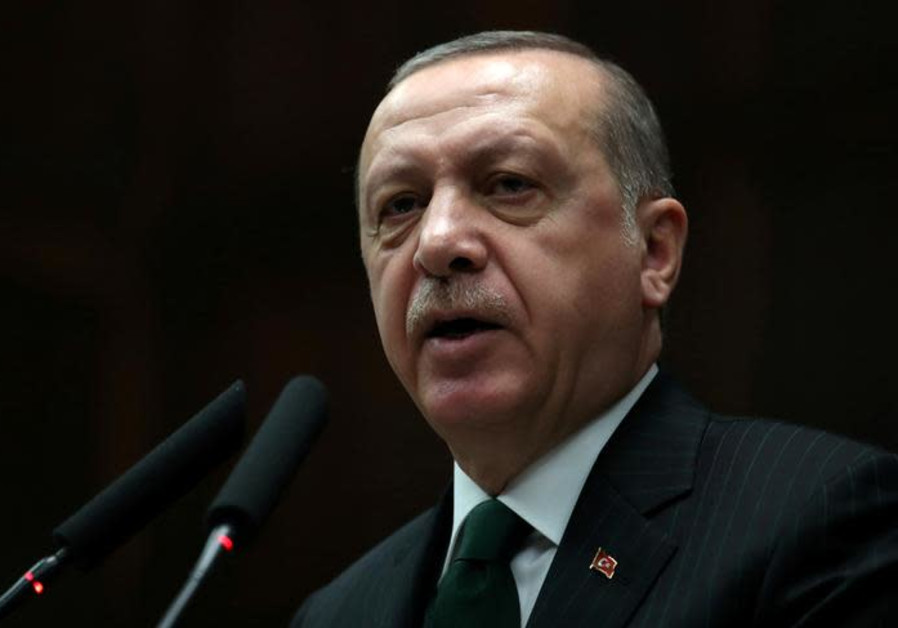Ankara seeks middle path between U.S. and Russia on Syria

Turkish President Tayyip Erdogan addresses members of parliament from his ruling AK Party (AKP) during a meeting at the Turkish parliament in Ankara, Turkey, March 6, 2018. (photo credit: UMIT BEKTAS / REUTERS)
Turkey, a member of NATO, was informed ahead of Saturday’s US-led air strikes on Syria. Ankara praised the strikes as appropriate but has warned against escalation, even as it has troops deployed throughout parts of northern Syria.
The different messages emanating from Turkey indicate its growing relations with Iran and Russia and an attempt to pose as the responsible actor in the Syrian conflict.
A day after the April 7 chemical weapons attack on Douma, Turkish President Recep Tayyip Erdogan criticized the Western response. “Hey, the West, where are you? You remain silent but you raised your voice when we killed terrorists in Afrin,” he said.
Turkey completed a three-month operation in the mostly Kurdish region of Afrin in northern Syria in March. Western powers had expressed concern about Turkey’s military aims even as Ankara claimed it was fighting terrorism. Erdogan claimed the West was being hypocritical. When President Donald Trump began boasting on Twitter about striking Syria and threatening Russia, the Turkish prime minister accused the US and Russia of “fighting like street bullies.”
Turkish presidential adviser Ibrahim Kalin wrote in the Daily Sabah on Friday that the US had failed in 2013 to stop Bashar Assad’s attacks and that the US “gave Russia and Iran the opportunity to enter the mayhem in Syria in full force.”
He claims that while the chemical weapons attack should be taken seriously, the US and Russia are engaging in unfinished bickering from the Cold War. Russia wants to challenge US hegemony, and Turkey appears to understand the need for that balance.
Turkey sees the Syrian conflict now as a place it can be an arbiter between the US and Russia. Erdogan spoke with both the Russian president and Trump, according to reports. Turkey also made sure that it would be informed about the strikes.
Ali Ozkok, a Eurasia analyst, pointed out on Twitter that after the Douma incident Ankara sought to focus criticism on Assad. “This is also due to [Russia Foreign Minister Sergei] Lavrov’s reminder to Turkey that the Turkish presence in Afrin was made possible by Moscow.”
At each turn Turkey seeks to both praise and urge caution and present itself as the peaceful partner. Prime Minister Binali Yildirim on Saturday said that the air strikes were a “positive step,” but also spoke about the need for peace.
How does Turkey foresee peace in Syria?
Kalin argues that “it must focus on establishing a legitimate, democratic and inclusive political order without the Assad regime or terrorist networks like Daesh [ISIS], al-Qaeda, the Democratic Union Party (PYD) or the People’s Protection Units (YPG).” The latter two groups are Kurdish parties that have worked with the US in eastern Syria to fight ISIS.
The Turkish agenda appears to be to use the areas it now controls in the north of country, including numerous allied Syrian rebel groups, for leverage toward a peace deal along these lines. Absent that it will continue to control those areas.
On Saturday, even as the air strikes were taking place, the 20th convoy of (3,500) displaced Syrians from Douma, mostly Sunni Arabs, arrived in Al-Bab in northern Syria, where Turkish-backed Syrian rebels greeted them.
Turkey sees Russia as a broker that has made it possible for Ankara to work inside Syria with the rebel groups, while the Assad regime consolidates its control over other areas. Any further US involvement could destabilize that agreement with Moscow, which is why Turkey has sought to portray itself as taking a middle road.





Comments are closed.